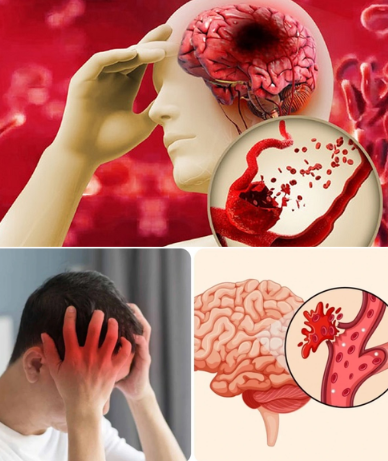
Stroke is one of the leading causes of death and long-term disability worldwide. In the United States alone, someone suffers a stroke every 40 seconds. Yet despite how sudden and frightening it can be, stroke is largely preventable. By understanding the causes and making key lifestyle changes, you can significantly reduce your risk and protect your brain health for years to come.
Let’s dive into how to prevent stroke the natural way — through awareness, action, and healthy habits.
What Is a Stroke and Why Should You Care?
A stroke happens when the blood supply to part of the brain is cut off — either due to a blockage (ischemic stroke) or a burst blood vessel (hemorrhagic stroke). Without oxygen and nutrients, brain cells begin to die within minutes. The damage can be severe and permanent, affecting speech, movement, memory, and even personality. That’s why prevention is so important. Many strokes are not just “bad luck” — they are the result of long-term health issues that we can address ahead of time.
Recognizing the Warning Signs
Before we jump into prevention, it’s important to know the early signs of a stroke. Quick recognition can save lives.
Use the acronym FAST:
- Face drooping
- Arm weakness
- Speech difficulty
- Time to call emergency services
Other symptoms include sudden confusion, vision problems, dizziness, or a severe headache with no known cause.
Top Lifestyle Changes to Prevent Stroke
Let’s be clear: stroke prevention starts with your daily choices. These 7 lifestyle habits can dramatically reduce your risk.
Control Your Blood Pressure
High blood pressure is the #1 risk factor for stroke. It silently damages blood vessels and increases the chance of a blockage or rupture.
What to do:
- Aim to keep your blood pressure below 120/80 mmHg
- Limit salt and processed foods
- Exercise regularly (at least 30 minutes most days)
- Manage stress through breathing techniques, walking, or hobbies
- Monitor your numbers often — at home or with a doctor
Eat a Brain-Healthy Diet
Your plate has more power than you think. Certain foods help keep your blood vessels flexible and your brain sharp.
Tips:
- Choose a Mediterranean-style diet: leafy greens, berries, olive oil, nuts, beans, and fish
- Limit red meat, trans fats, and sugary snacks
- Stay hydrated and avoid excess alcohol
- Include foods rich in omega-3s, potassium, and magnesium
Stay Physically Active
Movement keeps your heart and blood vessels in shape, reduces blood pressure, and lowers blood sugar and cholesterol.
How to start:
- Begin with brisk walking, swimming, cycling, or even dancing
- Try strength training twice a week
- If you sit a lot, stand and stretch every hour
- Find an activity you enjoy — consistency matters more than intensity
Maintain a Healthy Weight
Obesity is a major risk factor for stroke. It puts extra strain on the heart and increases the likelihood of high blood pressure, diabetes, and cholesterol.
Simple changes:
- Track your meals and portion sizes
- Avoid sugary drinks and processed foods
- Eat mindfully — slow down and chew well
- Consider support from a dietitian if weight loss feels overwhelming
Video : Help Avoid Stroke and Heart Attack! Dr. Mandell
Quit Smoking Immediately
Smoking damages blood vessels, thickens the blood, and increases clot risk — all of which can trigger a stroke.
Good news? The benefits of quitting begin within hours. Your stroke risk drops dramatically within a few years after quitting.
Need help?
- Talk to your doctor about quit aids (patches, medication, counseling)
- Replace smoking habits with healthy distractions
- Join a support group or quit-smoking app
Manage Diabetes and Blood Sugar
High blood sugar can harm blood vessels over time and increase your stroke risk.
What helps:
- Monitor your glucose levels if you’re diabetic
- Eat low-glycemic foods (whole grains, veggies, lean proteins)
- Avoid sugary snacks and sodas
- Stay active and keep a healthy weight
Get Regular Checkups
Silent health issues — like high cholesterol or irregular heartbeat — can go undetected until it’s too late. Routine medical checkups allow early detection and treatment.
Ask your doctor about:
- Cholesterol testing (LDL, HDL)
- Heart rhythm monitoring (especially for atrial fibrillation)
- Carotid artery ultrasounds
- Brain imaging if you have a strong family history of stroke
Natural Remedies and Supplements That Support Stroke Prevention
Although lifestyle changes are key, some natural aids may also help. Always consult a doctor before trying new supplements.
Popular options include:
- Omega-3 fish oil: supports heart and brain health
- Garlic: may help lower blood pressure and prevent clots
- Turmeric (curcumin): powerful anti-inflammatory
- CoQ10: supports cardiovascular function
- Magnesium and potassium: regulate blood pressure and nerve function
Remember, supplements should not replace healthy habits — they’re just an extra layer of support.
Stress Management Is Underrated (But Crucial)
Chronic stress raises blood pressure and inflammation, both of which increase stroke risk. That’s why relaxation isn’t a luxury — it’s a tool for health.
Try:
- Deep breathing or guided meditation (even just 5 minutes a day)
- Journaling your thoughts or gratitude
- Spending time in nature or with loved ones
- Limiting negative news and digital overload
Video : How to prevent a stroke 🧠🤔neuroscience
Final Thoughts: Prevention Is the Best Cure
You don’t have to wait for warning signs to take action. Stroke is often preventable with a few committed changes to your lifestyle. Think of it like building a shield around your brain — each healthy habit is a brick in that shield.
By eating well, moving often, managing stress, and staying connected to your health, you can reduce your risk and feel more energized every day.
Small steps lead to powerful protection.
Take that first step today — your future self will thank you.


